Introduction
Virtual private networks (VPNs) have become an essential tool for protecting your online privacy and security. VPNs work by creating an encrypted tunnel for your internet traffic, preventing third parties from accessing your data. This tunnel connects your device to a remote server operated by the VPN service.
There are many different protocols used to establish this encrypted VPN connection, each with their own strengths and weaknesses. Two of the most common protocols are Internet Protocol Security (IPSec) and IKEv2. Understanding how they differ can help you choose the best VPN option for your specific needs.
This guide will provide an in-depth comparison of IKEv2 and IPSec – from the technical details of how they operate to their speed, security, compatibility and more. Read on to determine which protocol meets your requirements for a fast, stable and private VPN connection.

What is IPSec?
Internet Protocol Security (IPSec) is one of the most widely used VPN protocols. It was created in the 1990s as an extension of the Internet Protocol (IP) to add encrypted communication capabilities.
IPSec establishes a secure channel for traffic between devices through:
- Authentication – Verifies the identity of the VPN server
- Confidentiality – Encrypts data to prevent eavesdropping
- Integrity – Checks messages weren’t altered in transit
This is accomplished using mechanisms called Security Associations (SAs). An SA is a shared policy between devices specifying the exact encryption, hash authentication, and key exchange methods to use to secure a VPN connection.
Encryption & Security
IPSec offers robust encryption to protect VPN traffic. Supported algorithms include:
- Symmetric Cryptography: AES, DES, 3DES
- Asymmetric Cryptography: RSA, DSA
- Hash Algorithms: SHA-1, SHA-2
256-bit AES is generally used today as the gold standard – extremely difficult for attacks to crack yet fast enough for good performance.
Security researchers have found some weaknesses in older IPSec encryption methods like MD5 hashes. But modern implementations use the more advanced SHA-2 algorithm to prevent attacks.
Speed & Performance
IPSec has minimal impact on internet speeds compared to other protocols. Exact performance depends on the encryption cipher used.
Light ciphers like AES-128 maintain quick speeds but AES-256 and SHA-384 offer better security at the cost of reduced speeds. IPSec may achieve anywhere from 10Mbps to over 200Mbps under optimal conditions.
Ports & Firewall Traversal
IPSec uses several standard ports for establishing VPN connections:
- UDP Port 500 – For IKE to negotiate SA parameters
- UDP Port 4500 – Optional, providing NAT traversal capabilities
- Protocol 50 & 51 – Encryption and authentication of IP Packets
Operating system firewalls usually allow these ports by default. But network firewalls may need manual configuration to open them up for IPSec to function.

What is IKEv2?
IKEv2 (Internet Key Exchange version 2) is a key component of the IPSec protocol suite responsible for setting up the encrypted VPN tunnel.
Specifically, IKEv2 handles the initial authentication and Secure Association (SA) negotiation between the VPN client and VPN gateway before routing traffic.
Improvements Over IKEv1
IKEv2 represents a major overhaul over its outdated predecessor IKEv1. Improvements include:
- Faster connection establishment – Authenticates and sets up SAs much quicker
- Better reliability – Self-healing capabilities restore VPN stability
- Efficient rekeying – Keys can be refreshed without re-authenticating
- Support for mobile – Maintains connections efficiently on mobile networks
This makes IKEv2 well-suited for devices connecting from frequently changing networks where reliability is critical.
Strong Security
In addition to all standard IPSec ciphers, IKEv2 supports added encryption algorithms like AES-GCM for greater security. Other standards allow encryption keys to be refreshed every hour for high entropy. Weak hashing methods like SHA-1 are no longer used.
Several mechanisms help ensure data security:
- Mutual authentication
- Extensible Authentication Protocol (EAP)
- Advanced encryption standard (AES-CBC) with secure hashes
Mobility & Multi-homing Support
A unique capability of IKEv2 is integration with the Mobility and Multi-homing Protocol (MOBIKE). This allows established VPN connections to continue uninterrupted when:
- Switching between networks
- Moving between WiFi and mobile data
- Transitioning IP addresses
This prevents the VPN tunnel from dropping on networking changes.
The IKEv2/IPSec Combination
Given the strengths of IKEv2 for authentication and connection setup, it is now commonly paired with IPSec for encrypting data transmission. This takes advantage of both protocols’ individual advantages.
The joint IKEv2/IPSec combo exhibits several desirable VPN characteristics:
Speed – IPSec minimally reduces connection speeds while IKEv2 quickly establishes tunnels.
Security – Extensive encryption and hashing functions protect against attacks.
Reliability – Self-healing connections stay active across network transitions.
Compatibility – Support across nearly all modern platforms from Windows and iOS to Android.
Many consider IKEv2/IPSec to be among the top protocol choices today due to these blended advantages.

Comparison with Other Protocols
How does IKEv2/IPSec stack up against alternatives like OpenVPN, L2TP/IPSec, and PPTP? Here’s an overview:
OpenVPN – Highly configurable open-source protocol. More vulnerable if not properly configured but fast speeds likely. Good choice for technical VPN users.
L2TP/IPSec – Combines IPSec with Layer 2 Tunneling Protocol. Built-in to most operating systems but slower than IKEv2. Weak security without additional IPSec encryption.
PPTP – Extremely outdated point-to-point tunneling protocol. Compatible on old systems but highly insecure encryption vulnerable to attacks. Not recommended.
The integrated encryption, hashing, and NAT-traversal support with IKEv2 makes it more robust and secure than SSL/TLS-based OpenVPN setups. And much faster performance than the dated PPTP or base L2TP protocols give it an advantage for streaming and downloads.
Conclusion
Choosing the most appropriate VPN protocol depends on your specific needs and priorities – there is no one “best” option for everyone.
IKEv2 offers a great balance of speed, security, stability and widespread compatibility. But properly configured OpenVPN setups can also deliver strong encryption with faster speeds.
In most cases today, IKEv2 or OpenVPN are preferable over dated solutions like PPTP or base L2TP tunnels. Analyze your requirements around privacy needs, connection reliability, speed vs security tradeoffs, and client support to pick the optimal protocol.
As cybersecurity threats escalate, using the most modern and advanced VPN protocols becomes increasingly important. Both IKEv2 and IPSec present great options for encrypting traffic and hiding your online identity – with IKEv2 offering enhanced reliability vital for mobile devices. Hopefully this overview gives you the knowledge to determine which solution best secures your digital communications according to your priorities.
I. Introduction
NordVPN has become one of the most popular virtual private network (VPN) providers on the market due to its commitment to protecting users’ privacy and security. As threats like data breaches, mass surveillance, and blocked censorship continue growing, tools like NordVPN act as a safeguard to keep internet activity, identity, and information private.
This comprehensive guide will explain everything you need to know about utilizing NordVPN’s industry-leading features across desktop and mobile devices to browse the web privately, access restricted content, defend against cybercriminals, and prevent network throttling. Read on to take control over your internet experience with NordVPN.
II. Understanding NordVPN
NordVPN is a Panama-based VPN service provider that encrypts internet traffic and routes it through remote servers run by the company. By connecting to one of thousands of worldwide server locations, NordVPN allows changing a device’s IP address and location – making it appear as if accessing the internet from another city or country.
Key benefits provided:
Military-Grade Encryption – Advanced security protocols like IKEv2/IPSec or OpenVPN encrypt traffic using strong ciphers like AES-256 and 2048-bit RSA keys. This prevents prying eyes from monitoring activity.
No-Logs Policy – NordVPN does not track or store user connection logs, time stamps, IP addresses, or browsing data. This provides confidence online movements stay private.
Onion Over VPN – Optional connection routing through the Onion network adds an extra layer of encryption and anonymity during secure sessions.
Obfuscated Servers – Specialty servers can stealth VPN traffic to bypass firewalls and network restrictions in heavily censored regions.
Specialized Server Types – Besides country-specific server locations, users can connect through servers optimized for P2P filesharing, double VPN or dedicated IP address access.
By leveraging this bundle of privacy features users can securely access geo-restricted content, defend against snooping on public WiFi, prevent price discrimination based on location, and more.

III. Getting Started
Signing up for NordVPN takes just minutes. Simply visit nordvpn.com and select the desired subscription plan. Options range from $3.29/month for 2-year commitments up to $14.99/month month-to-month. All plans provide the same feature set and support.
Next, download and install NordVPN applications onto each Windows, macOS, iOS and Android device you wish to secure. The apps allow managing connections, selecting server locations, and enabling additional privacy settings with just a few clicks.
Alternatively, router-level installations are available via NordVPN’s manual configs or through flashed router firmware images. This tunnels all traffic from any device connected to the NordVPN WiFi network.
IV. Using NordVPN
Using NordVPN typically involves just connecting to the fastest or desired privacy-focused server location:
- Launch the NordVPN application and log in using your NordVPN credentials.
- Optionally pick a specific country or city server location from the sortable list. Otherwise select the Recommended or Obfuscated server sections.
- Tap the ‘Quick Connect’ button or toggle the VPN connection slider to “On”. This will connect through the chosen server within seconds.
That’s all it takes to start shielding internet traffic! The NordVPN client will display a connection timestamp confirming protection.
Selecting Server Locations
In addition to privacy, NordVPN allows accessing region-restricted content by virtually changing locations. Connect through UK-based servers to view BBC iPlayer abroad, Indian servers to stream restricted Bollywood films, or Canadian servers to watch US Netflix titles unavailable elsewhere.
Server suggestions based on common use cases:
- Streaming – For US Netflix, pick US East servers. For BBC iPlayer try UK London servers.
- Security/Privacy – Choose Obfuscated or Double VPN server locations.
- Speed – Scan server list and connect to location with lowest latency and highest bandwidth.
- Filesharing – Select specialized P2P servers tagged with upload/download stats.
- Static IP – Assign consistent IP address by connecting to individual Dedicated IP servers.
Be sure to disconnect the VPN client when access to regionals sites is no longer required.

VPN Protocols
Windows and Mac computers additionally allow selecting alternative VPN protocols besides the default OpenVPN protocol:
- OpenVPN UDP – Fast reliable speeds well-suited for streaming but can be blocked in countries like China.
- OpenVPN TCP – Slightly slower speeds but higher reliability and works in more countries.
- IKEv2/IPSec – Fast modern protocol great for mobile use. Most secure option but has limited unblocking capabilities.
- NordLynx – Next-gen WireGuard based protocol uses ChaCha20 and Curve25519 encryption. Leading speeds and security.
- SSTP – Microsoft’s VPN standard. Decent speeds with firewall traversal but weak encryption schemes.
Each protocol varies in speed, reliability, security and ability to bypass firewalls. NordLynx offers the best overall blend using WireGuard. OpenVPN provides wide unblocking support. Test to determine the optimal fit.
V. Advanced Features
NordVPN provides several advanced features to take privacy and blocking evasion efforts even further:
Kill Switch – The kill switch will instantly halt internet connectivity for any programs running if the VPN connection unexpectedly drops. This prevents identity leaks by stopping unsecured traffic. Enable the kill switch under Settings > Kill Switch.
CyberSec – NordVPN’s custom CyberSec tool blocks ads, malware websites, and intrusive trackers while connected to VPN servers. Turn on CyberSec from Settings to prevent third parties from monitoring activity during private browsing sessions without impacting speeds.
Additionally, specialty Obfsproxy-cloaked servers provide an extra layer of obscurity to disguise VPN traffic as regular HTTPS traffic – crucial for bypassing deep packet inspection (DPI). Enable Obfuscated Servers under ‘Speciality Servers’ to leverage this stealthy technique where VPN access attempts are actively blocked.
Between powerful encryption, obfuscation capabilities, dedicated IP addresses, and doubling up servers – NordVPN provides multi-layered privacy protection tailored to different needs.

VI. Troubleshooting & Support
Like any software, intermittent connection issues may arise with NordVPN clients. Some troubleshooting tips:
- Refresh/switch server location – New server may resolve connectivity errors.
- Toggle protocol (UDP vs TCP) – Alternative protocol interpretation may work better depending on ISP.
- Update VPN app – Outdated client can prevent proper server negotiation.
- Check DownDetector site – Confirms whether wider outages are occurring.
- Contact 24/7 customer support via live chat or support ticket – Helpdesk can diagnose issues.
NordVPN specialists typically respond to inquiries within 1 minute via chat which is the fastest way to get personalized troubleshooting advice. Support agents can examine connection logs upon request to identify problems.
If connectivity problems recur, enabling OpenVPN debug logs before connecting then forwarding verbose text output to support staff helps technical diagnosis of root causes. Settings > Debug will activate debug log recording to highlight where encryption handshakes are failing.
Unblocking sites, improving speeds, or accessing specialty servers like Double VPN often involve tweaking settings based on use case. Don’t hesitate to leverage NordVPN’s responsive customer support for tailored configuration guidance.
VII. Conclusion
As internet surveillance, restrictions, throttling and cybercrime intensify – tools like NordVPN act as a safeguard to keep digital activity, identity and information secure. NordVPN’s reliable performance, extensive server network, layered privacy techniques and responsive support cement its position as an Editors’ Choice VPN solution.
Follow this guide to quickly deploy NordVPN across desktop or mobile systems, configure additional defenses like CyberSec ad-blocking, select optimal protocols and servers to unblock geo-restricted sites, troubleshoot issues and leverage expert guidance from customer support. Take the guesswork out of managing your VPN-protected worldspanning connection by letting NordVPN securely expand online access, anonymity and liberties.
I. Introduction
NordVPN has become one of the most popular virtual private network (VPN) providers on the market due to its commitment to protecting users’ privacy and security. As threats like data breaches, mass surveillance, and blocked censorship continue growing, tools like NordVPN act as a safeguard to keep internet activity, identity, and information private.
This comprehensive guide will explain everything you need to know about utilizing NordVPN’s industry-leading features across desktop and mobile devices to browse the web privately, access restricted content, defend against cybercriminals, and prevent network throttling. Read on to take control over your internet experience with NordVPN.
II. Understanding NordVPN
NordVPN is a Panama-based VPN service provider that encrypts internet traffic and routes it through remote servers run by the company. By connecting to one of thousands of worldwide server locations, NordVPN allows changing a device’s IP address and location – making it appear as if accessing the internet from another city or country.
Key benefits provided:
Military-Grade Encryption – Advanced security protocols like IKEv2/IPSec or OpenVPN encrypt traffic using strong ciphers like AES-256 and 2048-bit RSA keys. This prevents prying eyes from monitoring activity.
No-Logs Policy – NordVPN does not track or store user connection logs, time stamps, IP addresses, or browsing data. This provides confidence online movements stay private.
Onion Over VPN – Optional connection routing through the Onion network adds an extra layer of encryption and anonymity during secure sessions.
Obfuscated Servers – Specialty servers can stealth VPN traffic to bypass firewalls and network restrictions in heavily censored regions.
Specialized Server Types – Besides country-specific server locations, users can connect through servers optimized for P2P filesharing, double VPN or dedicated IP address access.
By leveraging this bundle of privacy features users can securely access geo-restricted content, defend against snooping on public WiFi, prevent price discrimination based on location, and more.

III. Getting Started
Signing up for NordVPN takes just minutes. Simply visit nordvpn.com and select the desired subscription plan. Options range from $3.29/month for 2-year commitments up to $14.99/month month-to-month. All plans provide the same feature set and support.
Next, download and install NordVPN applications onto each Windows, macOS, iOS and Android device you wish to secure. The apps allow managing connections, selecting server locations, and enabling additional privacy settings with just a few clicks.
Alternatively, router-level installations are available via NordVPN’s manual configs or through flashed router firmware images. This tunnels all traffic from any device connected to the NordVPN WiFi network.
IV. Using NordVPN
Using NordVPN typically involves just connecting to the fastest or desired privacy-focused server location:
- Launch the NordVPN application and log in using your NordVPN credentials.
- Optionally pick a specific country or city server location from the sortable list. Otherwise select the Recommended or Obfuscated server sections.
- Tap the ‘Quick Connect’ button or toggle the VPN connection slider to “On”. This will connect through the chosen server within seconds.
That’s all it takes to start shielding internet traffic! The NordVPN client will display a connection timestamp confirming protection.
Selecting Server Locations
In addition to privacy, NordVPN allows accessing region-restricted content by virtually changing locations. Connect through UK-based servers to view BBC iPlayer abroad, Indian servers to stream restricted Bollywood films, or Canadian servers to watch US Netflix titles unavailable elsewhere.
Server suggestions based on common use cases:
- Streaming – For US Netflix, pick US East servers. For BBC iPlayer try UK London servers.
- Security/Privacy – Choose Obfuscated or Double VPN server locations.
- Speed – Scan server list and connect to location with lowest latency and highest bandwidth.
- Filesharing – Select specialized P2P servers tagged with upload/download stats.
- Static IP – Assign consistent IP address by connecting to individual Dedicated IP servers.
Be sure to disconnect the VPN client when access to regionals sites is no longer required.
VPN Protocols
Windows and Mac computers additionally allow selecting alternative VPN protocols besides the default OpenVPN protocol:
- OpenVPN UDP – Fast reliable speeds well-suited for streaming but can be blocked in countries like China.
- OpenVPN TCP – Slightly slower speeds but higher reliability and works in more countries.
- IKEv2/IPSec – Fast modern protocol great for mobile use. Most secure option but has limited unblocking capabilities.
- NordLynx – Next-gen WireGuard based protocol uses ChaCha20 and Curve25519 encryption. Leading speeds and security.
- SSTP – Microsoft’s VPN standard. Decent speeds with firewall traversal but weak encryption schemes.
Each protocol varies in speed, reliability, security and ability to bypass firewalls. NordLynx offers the best overall blend using WireGuard. OpenVPN provides wide unblocking support. Test to determine the optimal fit.

V. Advanced Features
NordVPN provides several advanced features to take privacy and blocking evasion efforts even further:
Kill Switch – The kill switch will instantly halt internet connectivity for any programs running if the VPN connection unexpectedly drops. This prevents identity leaks by stopping unsecured traffic. Enable the kill switch under Settings > Kill Switch.
CyberSec – NordVPN’s custom CyberSec tool blocks ads, malware websites, and intrusive trackers while connected to VPN servers. Turn on CyberSec from Settings to prevent third parties from monitoring activity during private browsing sessions without impacting speeds.
Additionally, specialty Obfsproxy-cloaked servers provide an extra layer of obscurity to disguise VPN traffic as regular HTTPS traffic – crucial for bypassing deep packet inspection (DPI). Enable Obfuscated Servers under ‘Speciality Servers’ to leverage this stealthy technique where VPN access attempts are actively blocked.
Between powerful encryption, obfuscation capabilities, dedicated IP addresses, and doubling up servers – NordVPN provides multi-layered privacy protection tailored to different needs.
VI. Troubleshooting & Support
Like any software, intermittent connection issues may arise with NordVPN clients. Some troubleshooting tips:
- Refresh/switch server location – New server may resolve connectivity errors.
- Toggle protocol (UDP vs TCP) – Alternative protocol interpretation may work better depending on ISP.
- Update VPN app – Outdated client can prevent proper server negotiation.
- Check DownDetector site – Confirms whether wider outages are occurring.
- Contact 24/7 customer support via live chat or support ticket – Helpdesk can diagnose issues.
NordVPN specialists typically respond to inquiries within 1 minute via chat which is the fastest way to get personalized troubleshooting advice. Support agents can examine connection logs upon request to identify problems.
If connectivity problems recur, enabling OpenVPN debug logs before connecting then forwarding verbose text output to support staff helps technical diagnosis of root causes. Settings > Debug will activate debug log recording to highlight where encryption handshakes are failing.
Unblocking sites, improving speeds, or accessing specialty servers like Double VPN often involve tweaking settings based on use case. Don’t hesitate to leverage NordVPN’s responsive customer support for tailored configuration guidance.

VII. Conclusion
As internet surveillance, restrictions, throttling and cybercrime intensify – tools like NordVPN act as a safeguard to keep digital activity, identity and information secure. NordVPN’s reliable performance, extensive server network, layered privacy techniques and responsive support cement its position as an Editors’ Choice VPN solution.
Follow this guide to quickly deploy NordVPN across desktop or mobile systems, configure additional defenses like CyberSec ad-blocking, select optimal protocols and servers to unblock geo-restricted sites, troubleshoot issues and leverage expert guidance from customer support. Take the guesswork out of managing your VPN-protected worldspanning connection by letting NordVPN securely expand online access, anonymity and liberties.
Introduction
When accessing the internet, technologies like Domain Name System (DNS), Virtual Private Networks (VPN), and increasingly Smart DNS play a pivotal yet often overlooked role in not just enabling connectivity but also personal security and privacy.
How each protocol handles routing data can unlock content, obscure identity and location, or expose traffic to risks. Given rapidly escalating cybercrime and surveillance, understanding key differences empowers safer online experiences. This guide explores essential services, protections, use cases and limitations of DNS, Smart DNS and VPNs for more informed usage tailored to specific needs.
DNS (Domain Name System)
The Domain Name System (DNS) comprises the backbone directing all web traffic. Whenever you type a URL like example.com into a browser, DNS translates the domain name into a machine-readable IP address to route the request.
Domain Name Translation
A DNS query first checks locally then queries a hierarchy of servers to match a domain against published IP addresses maintained in global registries. Top level DNS servers communication with lower level name servers until identifying the correct corresponding IP to return. The browser then connects using this address.
Think of DNS like a giant phonebook matching friendly domain names people can remember to direct dial number IPs computers need to route communications. DNS makes reaching intended destinations possible.
No Inherent Security
Critically, the DNS protocol itself does not provide any encryption or security for data in transit between clients and servers. Traffic handled strictly through DNS remains visible to internet service providers (ISPs) and surveillance networks.
While essential for basic internet functionality, on its own DNS does not hide user identity, location or protect the contents of data sent between devices using translated IPs. Additional protections like VPNs or Tor are necessary to add security layers.

Smart DNS
Smart DNS offers a middle ground between bare DNS and robust VPN coverage by intelligently rerouting only select, sensitive traffic to secure destinations while leaving general traffic untouched.
Selective Rerouting
Like DNS, Smart DNS still translates domain names to IP addresses for site access. However, Smart DNS proxies reroute requests for specific sites and services to alternate IP addresses typically in different geographic regions to unlock content otherwise unavailable in particular locations.
For example, by mapping requests for US Netflix to route through US-based proxy IPs, Smart DNS allows bypassing geo-blocks to view titles restricted only to American Netflix subscribers as if accessing from America.
Yet for non-sensitive sites, regular unprotected DNS lookups proceed as normal without proxies to maintain performance. Think of Smart DNS as context-aware DNS providing surgical redirection only when necessary to defeat geo-fencing.
Privacy Tradeoffs
Due to enabling proxy rerouting for specific sites, Smart DNS provides a measure of obfuscation by masking regional identity solely when accessing geo-restricted services but no actual data encryption protecting full traffic like a VPN. General internet browsing remains as vulnerable as plain DNS lacking encryption safeguards.
VPN (Virtual Private Network)
Unlike DNS and Smart DNS focused strictly on mapping domain names to IP addresses, Virtual Private Networks (VPN) ensure full data security by handling all aspects of internet routing through encrypted tunnels.
Encrypted Data Tunneling
After connecting to a VPN server, every packet transmitted takes an encrypted pathway routing through the intermediary server before exiting to public networks. This fully masks the client IP address and encrypts data end-to-end preventing snooping.
Here’s how VPN data tunneling maintains privacy:
- Encryption applied to all data packets before exiting the local network prevents content inspection even by internet providers.
- Routing through intermediary VPN servers hides the true originating IP address and location.
- Emerging via new VPN IP address matched to server location obscures identity and region.
This makes VPN usage largely anonymous with all data shielded from prying eyes up until the VPN endpoint before contents get decrypted for public internet transit as usual.

Comparison Table
| Category |
DNS |
Smart DNS |
VPN |
| Primary Function |
Translates domains to IP addresses |
Selectively proxies geo-restricted traffic requests to alternate regions |
Encrypts and tunnels all traffic through VPN provider’s server network |
| Privacy |
None – traffic exposed |
Limited to proxied services, general traffic still visible |
Full encryption hides entire online footprint |
| Security |
No encryption mechanisms |
No encryption, some geo-restriction evasion |
Encrypts data making interception difficult |
| Speed Impacts |
Minimal slowdown |
Some delay due to proxy redirection |
Moderate speed reduction depending on protocols and encryption strength |
Use Cases
Now that we’ve explored the critical handling differences between regular DNS, Smart DNS and full VPN services, when should each be applied based on specific use case priorities?
Standard DNS
Universal DNS remains necessary for literally reaching any site or service online by mapping readable names to machine IPs. Without this fundamental layer, internet functionality breaks.
However lack of privacy makes bare DNS inappropriate for shielding sensitive traffic like financial transactions or medical communications against providers or snoops. It should be relied on exclusively only for general public browsing lacking confidentiality concerns.
Smart DNS
Unlock geo-blocked content from streaming platforms like US Netflix or BBC iPlayer abroad by redirecting DNS traffic through proxied endpoints in target countries. This provides targeted unblocking without compromises in speed or disruption of general browsing.
But for protecting all traffic from ISP monitoring, Smart DNS remains inadequate. Instead employ alongside VPN services to benefit from regional evasion only where necessary while VPN encrypts everything else universally.
VPN
When conducting any private communications or browsing where contents must stay obscured from internet providers, advertisers, cyber criminals and other malicious actors, connect via VPN conduits first to hide originating address and encrypt data end-to-end.
This shields identity and guards sensitive information traversing public networks while still securely reaching intended endpoints. Just beware speed tradeoffs inherent to encryption.
For maximum security and privacy, deploy VPN universally while toggling Smart DNS selectively only when accessing geo-fenced platforms regionally unavailable. Together they provide identity protection while opening restricted libraries. Falls back on regular DNS when no special handling required.
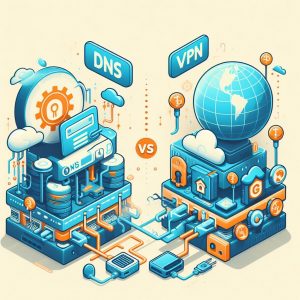
Conclusion
As the internet becomes exponentially more hostile toward privacy through unprecedented surveillance coupled with cyber attacks, every layer in the routing flow of traffic from domains to IPs presents opportunity for our data and identity to stay protected rather than exposed to those threats.
Technologies like DNS, Smart DNS and VPN serve unique purposes, provide varying cover and carry speed consequences when employed. By comprehending key offerings around security, geo-restriction evasion and encryption strengths of each solution and aligning usage against priorities for safeguarding sensitive communications versus more casual public browsing, we unlock safer internet experiences resistant against growing digital intrusions.
Introduction
A virtual private network (VPN) has become an essential tool for protecting one’s privacy and security when using the internet. As more people rely on public WiFi networks, using a VPN is critical to keep browsing activities private. But how exactly does a VPN work on WiFi networks? Can it be fully effective if connected through public hotspots? This article will provide an in-depth explanation of how VPNs function on WiFi, discuss using the Outline VPN service specifically, common issues that arise, and solutions to ensure a smooth, secure connection.
Definition of VPN
A virtual private network, commonly abbreviated as VPN, is a service that encrypts internet traffic and routes it through an intermediary server in a remote location. This creates an encrypted tunnel between a user’s device and the VPN server. The user’s traffic enters the tunnel from one end, reaches the VPN server at the other end, and exits to the public internet from there.
The encryption prevents third parties like internet service providers (ISPs), hackers, or governments from being able to view the contents of the traffic as it flows from the user’s device to the websites and services they are accessing. This allows people to browse the web privately and access restricted content anonymously via the VPN.
Importance of VPN
There are several important reasons why people use VPN services today:
- To access geo-restricted content – Many online streaming services have licensing restrictions that limit content availability based on geographical locations. A VPN allows people to bypass these restrictions.
- Public WiFi security – Using public hotspots carries the risk of man-in-the-middle attacks that can steal login credentials and other sensitive data. Connecting via a VPN while on public WiFi encrypts all traffic to stay secure.
- Privacy protection – VPN services do not log user activity, allowing people to keep their browsing histories private from ISPs and advertisers. This prevents tracking and profiling.
- Censorship circumvention – In countries that restrict access to parts of the internet, people can use VPNs to bypass censorship and access banned websites and apps.
As more people work remotely today, using public hotspots to connect to the internet, having a way to securely traverse WiFi networks has become critical. That is where understanding how VPNs function on WiFi is important.
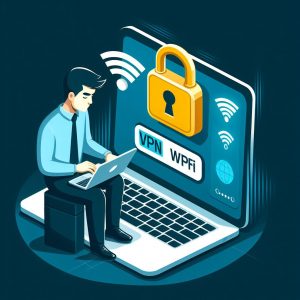
How VPN Works on WiFi
To understand how effective a VPN can be when connecting through WiFi, it is essential to first comprehend how VPN encryption works in general.
Explanation of How VPN Works
Without a VPN, internet traffic from a WiFi-connected device is transmitted directly to websites and services on the public internet. This makes it possible for third parties to intercept and view that traffic.
A VPN app on the device connects to a remote VPN server run by a VPN provider. This establishes an encrypted tunnel from the device to that server. Any traffic leaving the device is first routed through the VPN tunnel before exiting to the public internet.
The traffic is encrypted using protocols like Internet Protocol Security (IPSec) or Secure Sockets Layer (SSL). This means the contents cannot be deciphered by hackers or other third parties that may capture the data packets.
The traffic exits from the VPN provider’s server. Websites and services therefore receive the traffic from the VPN server’s IP address, not the user’s real IP address. This allows for anonymity while browsing.
Only the VPN provider can match the traffic back to the user’s device due to having access to the encryption keys, login credentials, and internal logs. Reputable services do not monitor user activity or keep extensive logs.
How VPN Works on WiFi
When connecting to public WiFi at a coffee shop, airport, hotel, or elsewhere, the device joins a network controlled by that establishment. While convenient, this carries security risks.
All traffic on public hotspots traverses the local network before reaching the wider internet. An attacker could position themselves within this network to capture traffic utilizing tricks like ARP spoofing or DNS hijacking.
By running a VPN app, the device has an encrypted tunnel that contains any traffic leaving it before reaching the untrusted public WiFi network itself. So the VPN protection is applied first before anything interacts with the hotspot.
This makes it near impossible for other users on the same network to intercept or view the contents of traffic headed to the VPN server. Even the WiFi operator would only see indecipherable encrypted data.
The VPN tunnel persists through to the server on the other end, which could be a country away, before data exits to its final destination. This gives users privacy and anonymity while on public networks.

III. Using Outline VPN
Outline VPN is one of several services that uses VPN technology to help protect users on public WiFi. Here is an overview of Outline, how it functions, and some troubleshooting tips.
Overview of Outline VPN
Outline VPN was created by Jigsaw, an incubator that is part of Google’s parent company Alphabet. The software-defined network provides users a free and easy way to encrypt traffic and mask their IP addresses.
Outline runs a global network of private servers that users can connect to via desktop and mobile apps. The app then routes all device traffic through an encrypted tunnel to the server before exiting to the open internet.
This works the same way on both WiFi and cellular connections. Unique to Outline is that anyone can also deploy their own Outline servers for others to use. This has helped the service grow quickly.
Outline relies on the Shadowsocks protocol rather than more common solutions like OpenVPN or IPSec. Shadowsocks uses 256-bit encryption and works at the transport layer to authenticate and encapsulate traffic.
How to Connect to Outline Server
Using Outline VPN on a phone, tablet, or computer takes just a few steps:
- Download the Outline client app for the relevant desktop or mobile platform from the official website. The mobile apps are also on the iOS and Android app stores.
- Open the app and select ‘Get Started’. This will bring up the server list. By default, it recommends the fastest and most reliable options.
- Tap on the server of choice and select ‘Connect’. This will establish the encrypted Shadowsocks tunnel.
- The app will display connection status. Once successful, internet traffic will now funnel through the tunnel to that server. The IP address visible to websites will mask the user’s real public address.

Troubleshooting Connection Issues
Sometimes VPN connections can unexpectedly drop or have trouble establishing a tunnel initially. Issues with Outline VPN could arise from:
- Server overload – Popular servers see high demand. Trying another option may work.
- Local network conflicts – Resetting WiFi routers or toggling airplane mode can clear conflicts.
- Software bugs – Updating apps and rebooting devices generally helps resolve software glitches.
- Regional blocking – Some countries actively block VPN traffic. Different protocols like WireGuard may be better suited.
- Client misconfigurations – Deleting and reinstalling apps often fixes inconsistencies causing failed handshakes.
Getting in touch with Outline’s customer support can also help diagnose difficult connectivity problems.
Issues with VPN on WiFi
While connecting to public WiFi hotspots through a VPN keeps online activity secure, users may still experience periodic issues that disrupt seamless usage. Understanding why problems crop up and how to address them is valuable for staying protected.
Common Issues with VPN on WiFi
Using a VPN over WiFi networks can pose challenges around speed, stability, and privacy:
- Reduced internet speeds – Routing traffic through distant VPN servers causes latency and bandwidth bottlenecks that downgrade connectivity speeds.
- Connection reliability – Changing WiFi networks as people move about can cause VPN disconnections. Public hotspots themselves also experience outages at times.
- DNS and IP leaks – Software bugs or configuration errors can allow DNS requests and device IP addresses to bypass the VPN tunnel and transmit externally in plain text.
- Inconsistent encryption – Weak WiFi security protocols like WEP open holes that either break or downgrade VPN encryption strength.
Solutions to VPN Issues on WiFi
Here are ways to troubleshoot and remedy some of the common VPN problems that tend to appear more often when users are connecting via WiFi hotspots:
- Quickly switching between servers on the VPN app can help alleviate speed issues caused by distant locations or overloaded access points.
- Enabling ‘Auto-Reconnect’ on VPN clients will quickly restore dropped connections – both the hotspot and VPN link – without much downtime.
- Leak testing sites can detect DNS or IP leaks. Changing security settings on VPN apps typically address them.
For weak WiFi encryption, using a software or hardware-based WiFi Protected Access 3 (WPA3) client can bolster transmission protection.
Conclusion
Virtual private networks have become essential for securing WiFi traffic as hotspot usage continues to increase globally. Understanding how VPN encryption interacts directly with public networks sheds light on its effectiveness for privacy and circumvention. While periodic speed or stability issues still arise, troubleshooting and configuring clients properly keeps problems at bay.
For those looking for a capable VPN solution to stay safe on the go, Outline VPN provides an accessible way to traverse WiFi safely. As with any VPN provider, fully trusting the platform requires carefully vetting its privacy policies around activity logging and user identity protection. Outline’s association with Google via Jigsaw is either reassuring or concerning depending on one’s views regarding big tech and data stewardship.
Ultimately, the threats posed by unprotected public WiFi access necessitate utilizing a VPN whenever connecting digitally in public spaces. Taking the time to research providers, implement secure configurations, and rectify connectivity issues pays dividends for long term safety and privacy while traversing wireless networks.
Introduction
Virtual private networks (VPNs) have become an essential tool for protecting one’s privacy and security online. As mobile devices proliferate and cellular networks continue improving speeds, using a VPN on mobile data offers clear benefits. But how reliably can VPN encryption function when running on 3G, 4G LTE, or 5G cellular connections? This article will analyze the effectiveness, pros, cons, protocols choices, and limitations to using VPN services over cellular data.
Importance of VPNs on Cellular Networks
Cellular networks present easier avenues for user tracking and data interception versus WiFi. Internet traffic must traverse carrier infrastructure which identities devices by unique identifiers like IMEI numbers. Law enforcement also taps into carriers more easily under legal warrants and subpoenas. This reduces privacy protections.
Additionally, public WiFi typically encrypts data making passive sniffing difficult. But cellular protocols can still transmit data openly allowing easier capture by fake base stations and stingrays. VPNs provide requisite encryption to harden such vulnerabilities.
Brief Overview of How VPNs Work on Cellular Data
The basic mechanics behind establishing an encrypted VPN tunnel over mobile data versus WiFi remain unchanged. VPN client apps on devices negotiate secure connections with servers often located in foreign countries run by VPN providers.
This requires routing through the cellular network first before entering the public internet. Traffic then flows across the internet encrypted, exits through the provider’s server, and proceeds to its final destination.
This protects the data contents from the cellular carrier itself as well as actors on the global internet. Changing the connecting medium from WiFi to mobile data does not alter the fundamentals of how VPN protocols operate.
However, the limitations and constraints of mobile networks compared to generally less constrained WiFi networks impacts connectivity speeds and reliability which we will explore later on.
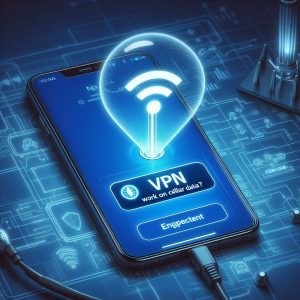
How VPNs Affect Mobile Data Usage
Running VPN services on cellular networks comes with data consumption tradeoffs that users should keep in mind depending on their plans and caps.
Increased Data Usage Due to Encryption Overhead
The encryption within VPN tunnels carries communication overhead that incrementally enlarges transmission sizes. On desktop OS platforms, the difference gets measured around 2 – 5% per session. But on mobile devices, the total usage bump climbs higher to between 4 – 20%.
That encompasses both the baseline encryption overhead as well as background connection maintenance traffic. Apps have to work harder across unreliable cellular networks to persist secure channels.
This data overhead total should not deter people from using mobile VPNs given the privacy importance. But tracking usage levels helps avoid unwanted overage fees depending on data limits.
Data Consumption Depending on VPN Protocol
Some VPN protocols push more data back-and-forth than others to keep sessions alive. Therefore the choice of mobile VPN protocol impacts cellular data consumption patterns. Protocols considered most data efficient include:
- WireGuard – Uses state-of-the-art cryptography that minimizes transmission overhead.
- OpenVPN (UDP) – Relies on fewer keep alive messages pushing less maintenance data.
- IKEv2 – Also utilizes efficient UDP packet tunnels thus consuming less idle data.
OpenVPN over TCP along with older IPSec systems feature notably higher overhead resulting in amplified mobile data usage levels.
So opting for a well-optimized VPN protocol provides ways to damper ballooning data costs when relying on cell signals.
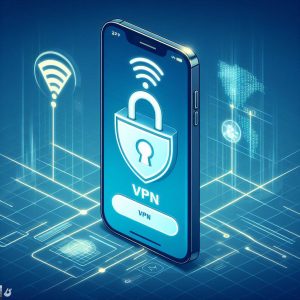
Why Use a VPN on Cellular Networks?
There exist clear advantages from running VPN services on mobile devices using cellular data instead of traditional WiFi networks:
Accessing the Internet Via Mobile Data
People choose to access the internet directly through mobile data plans when:
- WiFi networks remain unreliable, insecure or completely unavailable in their usage environments.
- They travel locations lacking WiFi but need connectivity for critical activities like banking or work.
- Public WiFi portals create usage friction with sign-on processes or content restrictions.
In these cases, firing up the VPN over cellular data acts as a convenience to maintaining web access quickly and securely versus hunting for open or paid WiFi hotspots.
Bypassing Geo-blocking and Internet Censorship
Governments and content providers leverage IP address blocking techniques to limit access based on geographical location. However, VPN services assign IP addresses from their own server locations outside restricted regions.
So when cell phones run VPN tunnels through distant servers before reaching the web, geo-blocks get bypassed granting access to content previously unavailable. This works the same whether traversing cellular signals or tapping WiFi networks.
People similarly leverage VPN IP address masking effects for anonymously circumventing censorship firewalls when only cellular data proves accessible or if regimes restrict WiFi. Once VPN connections establish, banned sites and services get unlocked.
Enhancing Security and Privacy
Public WiFi presents massive security issues from man-in-the-middle attacks to simple unencrypted traffic sniffing. While cellular data also risks interception, it enjoys advantages around default encryption present on carriers versus open hotspots.
Running VPN services over mobile data adds an additional hardened tunnel. Even if cellular data gets intercepted, the VPN encryption protects contents rather than transmitting openly. VPNs also prevent cellular carriers themselves from directly viewing unencrypted web activity.
Therefore mobile VPNs provide essential privacy enhancements and reduce attack surfaces by removing insecure open WiFi from the equation when on the move.

VPN Protocols for Cellular Networks
Selecting high-performance VPN protocols purpose-built for cellular data should remain a priority when choosing mobile VPN services:
IKEv2 or IKEv2/IPSec as Top Choices
Internet Key Exchange version 2 represents the fastest and most resilient protocol across unreliable cellular networks. It utilizes UDP for efficiency while maintaining robust security protections like perfect forward secrecy and strong 256-bit AES encryption.
IKEv2 builds on modern IPsec VPN tunneling. Major platforms natively support both IKEv2 and IPsec allowing simplified client configurations. VPN providers offering either generally deliver better performance and persistence as users roam between cellular base stations.
Other Reliable Protocols Like WireGuard
WireGuard constitutes an emerging VPN protocol focused on speed, security, and simple cross-platform implementations. It employs state-of-the-art cryptography like Curve25519 for handshake exchanges and ChaCha20 for encryption.
These algorithms execute much faster than older standards while running securely on low-power mobile processors. WireGuard prioritizes resilient connections on cellular networks through concise keep-alive messages and connection migration.
While IKEv2 remains the top choice for the moment, WireGuard offers a modern alternative already providing reliable mobile VPN coverage with broader adoption forthcoming.
Limitations of Cellular Data VPNs
Despite the performance optimizations various VPN protocols employ, some inherent limitations around using VPNs on cellular networks remain:
Cannot Bypass Cellular Data Caps
Carriers implement monthly data caps and throttling on cellular plans meaning increased VPN overhead still counts against imposed limits. VPN encryption may reduce third-party tracking and censorship but does not help bypass data restrictions imposed by carriers themselves.
Users get protected from external threats but must vigilantly monitor consumption to avoid overages or speed downgrades after reaching caps. In some cases, disabling the VPN when not actively needed can help minimize cellular data accumulation.
Slightly Slower Connections Due to Encryption
Added VPN encryption tunnels increase processing strain when transiting cellular networks versus direct unprotected connections. This manifests in marginally higher latency and marginally lower bandwidth throughput.
Performance degradation generally measures under 10% depending on cellular signal strength. For strong 4G LTE and 5G connections, users will barely notice. But weaker cellular signals may compound VPN speed impacts.
Modern protocol choices like IKEv2 and WireGuard aim to minimize this tradeoff as much as possible while still applying encryption security.
Conclusion
Virtual private networks offer critical security and circumvention capabilities for mobile users that more than justify added cellular data consumption or minor speed decreases. Choosing VPN providers using robust protocols designed specifically for unreliable mobile networks ensures the most reliable connectivity.
IKEv2 and the emerging WireGuard standard rank as best-of-breed options today for maximizing cellular VPN performance. As carriers expand 5G availability, speeds should ameliorate VPN taxing effects even further. With mobile device usage continuing to overtake traditional computing, relying on cellular network VPNs will only increase in necessity moving forward.
Introduction
A virtual private network (VPN) has become an essential internet security and privacy tool for protecting one’s data and identity online. As more people work remotely and rely on public networks, using a VPN is critical. However, configuring VPN access on multiple devices can prove burdensome. This is where creating a VPN hotspot delivers convenience benefits.
A VPN hotspot allows a primary internet-connected device to share its encrypted VPN tunnel securely with additional nearby devices over Wi-Fi. Devices like phones, laptops, and tablets can connect to the VPN wireless network being broadcast to surf the web safely and privately without needing separate VPN client software installations.
This guide will walk through how to set up a VPN hotspot, discuss the advantages of this connectivity approach, cover limitations to keep in mind, and suggest alternatives.
Definition of a VPN
A VPN creates an encrypted tunnel through which a device accesses the public internet. Traffic flows through the encrypted VPN tunnel first before exiting to the open web. This prevents third parties like hackers or ISPs from being able to monitor a user’s activity or steal sensitive data as it flows towards websites and applications online.
VPNs also provide the ability to mask one’s IP address and location. By funneling connections through VPN server endpoints in foreign countries before reaching the open internet, websites perceive requests as arriving from those server geolocations allowing users to bypass regional access restrictions to content.
Importance of VPNs
There exist compelling reasons why people utilize VPN services today:
- Public WiFi Security – Open hotspots carry risks of man-in-the-middle attacks allowing hackers to steal passwords and data. VPN encrypted tunnels provide protection against malicious actors monitoring unsecured WiFi traffic.
- Access Restricted Content – Video streaming platforms like Netflix limit content availability based on geographical licensing agreements. VPN IP masking helps people bypass these restrictions.
- Privacy Protection – VPN services route traffic through encrypted tunnels and do not keep activity logs. This prevents internet providers and advertisers from tracking browsing data and building profiles on consumers for profit or governmental surveillance overreach.
How a VPN Works
Without a VPN, web traffic from a WiFi-connected device heads out directly onto the public internet. Third parties can monitor the unprotected data. VPN apps create encrypted tunnels between the user’s device and the VPN provider’s server. Traffic now flows through this tunnel before reaching the open internet, keeping data safely encapsulated and secure from prying eyes or attacks.
This prevents the local WiFi network, internet providers, and other malicious global entities from being able to intercept or view data as it heads toward its ultimate destination. For other nearby devices to leverage the encrypted tunnel, the VPN connection must get shared over the local WiFi network, thereby converting it into a VPN hotspot that other devices can join.

Setting Up a VPN Hotspot
Creating a VPN secured WiFi hotspot requires three main steps:
- Choosing a capable VPN provider service
- Installing the VPN provider’s app and configuring the connection on the hotspot device
- Enabling the hotspot broadcast feature alongside the VPN which shares access
Choose a VPN Service
Many VPN providers exist nowadays providing apps across various platforms. Key aspects to evaluate include:
- Server Network Coverage – Global server networks ensure location masking flexibility and high speeds.
- Platform Support – Apps across Windows, macOS, Android, iOS, Linux and router firmware.
- Unlimited Device Connections – Enable securing as many devices as required through the WiFi hotspot.
- No Activity Logging – Ensure safe private browsing when sharing the VPN locally.
Top recommendations fulfilling these criteria include:
- Outline – Accessible VPN from Alphabet’s Jigsaw, runs on Shadowsocks protocol. Easy setup.
- ExpressVPN – Fast speeds with 3,000+ servers and wide protocol support.
- NordVPN – Robust server park with industry-leading security.
Install VPN Software
Once signed up with a chosen provider, installing the VPN app on the hotspot device is straightforward:
- Download the appropriate VPN client software from the provider onto the machine or mobile device that will share access. Many offer direct links via website or app stores.
- Open the VPN app and login using account credentials set up during initial registration.
- The app walks through connecting to the provider’s remote servers – tap Connect to establish and route traffic through encrypted VPN tunnel to the server.
Configure Hotspot VPN Sharing
To extend the encrypted VPN session to additional local devices, WiFi hotspot functionality needs enabling alongside active VPN:
- Enter the network settings area on the machine/device hosting VPN to turn on ability to broadcast a WiFi network which other devices can see and join.
- Give the hotspot network a name like “My VPN Hotspot” to identify it easily. WiFi password credentials can be configured for access control.
- Once devices connect to this WiFi, they will automatically route their traffic through the encrypted VPN tunnel on the host device before heading out to the public internet. No per device VPN installation required.
By default, most platforms route only the host device’s traffic via VPN but block connected devices from leveraging the tunnel. Special configurations or third-party apps may help override such software limitations on some hardware.

Advantages of VPN Hotspots
Utilizing a VPN hotspot provides several meaningful benefits:
Encrypted Internet Traffic
With rising cyberattacks and unregulated data monitoring/selling, unencrypted web activity poses major privacy issues. VPN hotspots allow quick extension of encrypted tunnels to many local devices simultaneously. All devices connecting wirelessly surf the web with full data protections rather than open transmission vulnerabilities.
Anonymity
Masking one’s identity is critical in an age of invasive ad targeting and location tracking surrounding all things digital. Using a foreign-located VPN server as intermediary before web traffic exits to destinations hides originating IP addresses. Websites only see the VPN’s server IP making connected devices anonymous.
Access Restricted Websites & Services
Video streaming platforms and national broadcasters actively limit content availability based on geographical licensing agreements. However, VPN IP masking tricks these services into believing requests come from supported countries granting full access. VPN hotspots provide such geo-unblocking abilities to all connected nearby devices automatically.
Limitations & Challenges
While useful, sharing VPN access via WiFi does come with certain limitations:
Performance Issues
Adding VPN overhead on two fronts – encryption plus WiFi rebroadcasting – can downgrade speeds. Both the hotspot device and connected devices struggle with latency bottlenecks. Enabling performance optimization features on VPN apps helps mitigate but fundamental constraints remain when daisy-chaining access methods.
Compatibility Issues
Some platforms prohibit extending VPN protections to secondary devices simultaneously. Apps may only secure host device traffic. MANET technologies like ad-hoc WiFi modes might enable better VPN sharing. But client devices also require appropriate hardware/software capabilities around handling tunneled WiFi data flows. Older equipment can struggle with adding VPN layers over already resource-intensive WiFi broadcast functionality.
Alternatives for Creating VPN Hotspot
If faced with limited native platform support, third-party solutions provide alternative avenues:
Router Built-In VPN Support
Select commodity and commercial-grade routers allow installing VPN client software directly onto the firmware with access shared across wired and wireless connections automatically. Open-source firmware like DD-WRT also opens additional configuration options. This simplifies enabling VPN hotspot capabilities versus manual software configurations.
Dedicated VPN Hotspot Apps
Apps like NetShare and WeVPN offer seamless VPN sharing by handling network routing nuances independently. They broadcast a virtual adapter on host devices which other operating systems transparently connect with for piping web traffic securely. Some paid versions also permit simultaneously connecting devices to different VPN server endpoints.
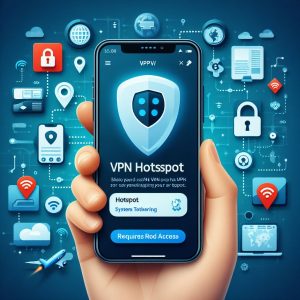
Conclusion
Virtual private network hotspots constitute invaluable tools for easily extending essential internet privacy and security protections to many nearby WiFi devices simultaneously. Limitations around performance and compatibility do exist when chaining VPN encryption atop WiFi access sharing. Selecting capable VPN providers combined with the right software hacks or compatible hardware grants simplified secured web usage for families, work teams, public spaces and other multi-user situations.
As digital threats proliferate globally, relying on VPN hotspots represents a convenient connectivity method for guarding internet communications against intrusions during regular usage across home networks, workplaces or travel scenarios involving multiple devices.
I. Introduction
As working from home becomes ubiquitous, using virtual private networks (VPNs) to access company resources remotely is crucial. However, many routers have issues handling multiple VPN connections simultaneously. This is where VPN passthrough or VPN pass-through comes into significance as a concept for home office and enterprise environments alike.
- Definition of VPN Passthrough
VPN passthrough refers to technology allowing a VPN connection to pass or tunnel through a router to reach devices on a local private network rather than terminating the tunnel at the router interface.
This means devices like PCs, mobile phones, and even other routers behind the main router gain access to the external VPN tunnel securely without needing separate VPN client software installations.
The router essentially acts as an intermediary for VPN tunnel data flows intended for devices further downstream. Traffic enters the router encrypted, the router reads the headers and forwards complete payloads to internal network destinations.
- Importance of VPN Passthrough in Routers
- Avoid Traffic Bottlenecks: Terminating VPN tunnels at the router causes throughput drops from encryption overhead. Passthrough preserves full bandwidth for each device.
- Simplify VPN Configurations: Without passthrough functionality, every device requires manual VPN client installation/credentials to connect independently.
- Enable Remote Access: Passthrough extends VPN accessibility benefits to local network devices like network-attached storage units and printers.

II. Setting Up VPN Passthrough On a Router
Enabling reliable VPN passthrough involves understanding router capabilities, protocols, and proper configuration steps:
- Understanding The Need For VPN Passthrough
Consumer-grade routers often only support a single VPN connection. Even high-end routers handle only a few concurrent separate VPN tunnels depending on processor and memory constraints.
With the average digital household now containing over a dozen networked devices, passthrough technology is essential to maximize VPN accessibility benefits without upgrades.
Almost all router firmware builds now incorporate passthrough configs to handle NAT traffic flows from a single terminated VPN session headed to multiple internal endpoints.
- Configuring VPN Passthrough On Different Router Models
Implementation settings vary across router brands but generally involve:
- Enabling VPN passthrough in the firmware alongside remote/VPN management functions.
- Selecting passthrough protocols – PPTP, L2TP and IPSec being predominant.
- Prioritizing VPN traffic using Quality of Service and bandwidth allocation management tools.
- Implementing custom firewall and routing rules to direct terminating VPN tunnel flows towards specified internal IPs and wireless network segments only.
- Tightening WAN security through obscuring gateway identifying data like MAC addresses via custom specifications.
- Protocols Used in VPN Passthrough
Common protocols leveraged for VPN tunneling include:
- PPTP – Point-to-Point Tunneling Protocol – Easy to configure but less secure.
- L2TP/IPsec – Layer 2 Tunnel Protocol with IP Security encapsulation – More secure with encryption.
- OpenVPN – Utilizes SSL/TLS protocols. Customizable encryption strength.
PPTP simplifies setup but lacks encryption. L2TP tunnels require IPSec layers for security enhancements like authentication and strong AES encryption to enable passthrough confidence.

III. VPN Passthrough vs VPN
While the concepts sound similar, key differences separate VPN passthrough and direct VPN usage:
- Key Differences
- VPN Passthrough provides single tunnel accessibility to multiple local network devices.
- Standard VPN requires individually establishing secure connections for each endpoint device.
- Passthrough funnels VPN inside local network with external traceability capped at the router interface.
- When To Use VPN Passthrough
Ideal uses cases for passthrough include:
- Simplifying home office VPN access for multiple devices.
- Allowing game consoles and media boxes to leverage VPN geo-unblocking.
- Granting IoT devices like security cameras access to remotely hosted controller platforms only available via corporate VPN links.
- When To Use A Full VPN
Despite advantages, utilizing direct VPN connections remains preferable when:
- Router firmware lacks passthrough support for necessary protocols and hardware-accelerated encryption.
- Devices need varied VPN endpoint locations based on usage scenarios like region-specific content access.
- Custom VPN toolsets around diagnostics and configuration management are required on per device basis.
- Legacy equipment prevents firmware upgrades to support advanced passthrough.

IV. Using VPN Passthrough In Enterprise Environments
Managed passthrough deployments require greater considerations around routing capacities, security policies and access management versus home usage:
- Benefits of VPN Passthrough For Enterprise
- Minimize endpoint code maintenance – no repeated client VPN software installations.
- Simplify network architectures – single tunnel handling instead of multiple termination points.
- Granular access controls – route groups of endpoints through designated gateways.
- Best Practices For Enterprise VPN Passthrough
Effective large-scale implementations should follow guidelines like:
- Dedicated passthrough appliance or gateway – avoids overloading existing router.
- QoS prioritization – ensures passthrough traffic gets precedence, avoid bottlenecks.
- Group-based access policies – assign departmental endpoint bundles their own passthrough gateways.
- Custom firewall settings – limit passthrough source/destination scope to internal network only.
- Security Considerations For VPN Passthrough
Enabling any remote access channels requires heightened security postures like:
- Multi-factor authentication for initial VPN connection – protects passthrough integrity right from the source.
- MAC address filtering on gateways – prevents unauthorized endpoint connections.
- Deploying IPsec rather than PPTP for encryption strength.
- Unique credentials for passthrough appliances to limit exposure of companywide VPN credentials.
V. Conclusion
- Summary Of The Advantages Of VPN Passthrough
VPN passthrough technology simplifies extending essential remote access benefits to multiple local area network devices by funneling VPN tunnels through routers instead of terminating connections per device.
Home consumers rely on passthrough for addressing router hardware limitations around concurrently hosting distinct VPN sessions. The approach also minimizes firmware and client software handling complexity.
For managed enterprise environments, passthrough centralizes VPN access delivery enabling concentrated monitoring/security fortification while cutting down extensive endpoint client configurations.
- Future Trends In VPN Passthrough Technologies
Emergent standards like Security-Enhanced Linux offer application-level enhancements atop core protocol encryption for hardened endpoint group microsegmentation policies.
As virtualization matures further, network functions like VPN passthrough may shift from dedicated physical appliances to low overhead software instances easily chained to balance growing remote access demands.
Finally, increasing automation around orchestrating user-based access permissions will eradicate tedious IP table rules to route passthrough traffic, replacing them instead with dynamic identity-centric approvals.
With remote connectivity becoming more mission-critical daily, the importance of efficient and secure VPN passthrough methods will only accelerate for both home and corporate networks moving ahead.
Listvpn.net
Listvpn.net offers a free L2TP-based VPN service with Australian servers available. The service encrypts internet traffic and masks real IP addresses granting anonymity protection when accessing geo-restricted content or public WiFi hotspots.
As Listvpn does not keep internal activity logs, third-parties cannot track browsing data. Unlimited bandwidth availability also makes it suitable for streaming or downloading large files. Compatibility spans across Windows, Mac, iOS, Android, Linux devices and some router firmware builds.
For simplified setup, ListVPN provides preconfigured profiles for major platforms to auto-fill authentication parameters. This enables quick deployment for people lacking advanced technical skills. However, with only 3 server locations globally, distance factors may downgrade performance. But as a gratis option focused on basic privacy needs, ListVPN delivers admirably.
01Net
French website 01Net compiled dedicated recommendations of top free VPN options available specifically for Australian residents based on criteria like speeds, server proximity, and privacy policy trustworthiness.
- TunnelBear – Offers limited but free monthly data, ideal for basic browsing protection needs. Simple clients across all major platforms. Uses trusted AES-256 and DNS leak protection encryption standards. Limited to only 2 server locations when in unpaid mode which impacts speeds.
- AVG Secure VPN – More geographically diverse servers including local Australian options for better speeds. Powered by Avast security tools bringing antivirus and malware blocking protections. Data allowance maxes out at 2GB per month for non-paying members. Supports OpenVPN and IPSec protocols. No DNS/IPv6 leak safeguards during free usage.
- Opera VPN – Integrates directly into the Opera web browser platform for simplified security during browsing sessions. Uses 256-bit encryption channeled through dedicated VPN servers. Unlimited free data option presents rarity amongst providers. Overall speeds fall short of commercial services. Lacks configuration flexibilities and geographic server diversity. DNS leak issues also crop up periodically.

Vpnkeep.com
Positioned as a free beginner-level VPN solution, vpnkeep offers L2TP-encrypted servers in over a dozen global regions including Australia and New Zealand forresident digital privacy needs. It allows torrenting activity many competitors block.
The website outlines step-by-step connection guides covering Windows, iOS, Android, Mac and Linux installs. Some technical website forums reference dns leaks during usage but vpnkeep does clearly document lacking leak protection. L2TP encryption also falls short of modern standards without IPSec augmentation. For ad-supported free access, vpnkeep provides useful starter privacy protections.
UrbanVPN
This Australia-based provider specialized specifically in creating a free tier VPN service for local digital privacy requirements. It offers over 75 regional servers to keep latency low allowing HD streaming and fast downloads. Supported platforms span Windows, Android, iOS, Linux and routers like DD-WRT and Tomato.
It relies on industry-standard AES-256 encryption coupled with a zero-logging policy on traffic activities. Each free account allows 5 simultaneous connections permitting securing multiple household devices. The website references third-party DNS and IPv6 leak testing successfully passing. While speeds throttled and server locations limited on the unpaid tiers, UrbanVPN delivers Australians a locally-focused free VPN option for protecting casual browsing.

Benefits of Using a Free VPN in Australia
Despite some limitations around speeds and configuration controls, utilizing free VPN tiers in Australia carries useful advantages:
Access Geo-Restricted Websites & Content – Services like Netflix and BBC iPlayer actively block overseas viewership citing licensing right barriers. Free VPNs that offer Australian endpoints provide ways around such geo-fencing.
Anonymity & Privacy Protection – Masking real IP addresses while encrypting data keeps browsing activities safe from tracking by advertisers or internet providers selling consumer usage insights without consent.
Public WiFi Protection – Open hotspots present security nightmares with easy traffic sniffing. But connecting via Australian VPN servers before transmitting data helps keep airport or cafe WiFi sessions protected against snooping.
Bypass ISP Restrictions – Australian internet providers actively block file sharing and torrent sites. Local free VPN tunnels help circumvent such censorship to access restricted platforms.
How To Choose The Best Free VPN For Australia
While the mentioned options provide worthwhile free services, selecting paid commercial VPNS focused on Australian servers unlocks superior experience around metrics like:
Speed – Paid platforms leverage higher-capacity infrastructure including localized servers improving latency and bandwidth throughput. Budget providers can struggle with peak load demands.
Security – Commercial tools integrate leak protection and support modern standards like IKEv2 and WireGuard protocols for strongest encryptions. More exposed vulnerabilities crop up amongst unpaid purveyors.
Ease-of-Use – Subscription services invest in polished software clients across platforms minimizing connection and configuration troubles. Meager developer resources can hamstring free offerings.
Ultimately the need for balancing reliable security protections while accessing regionally limited streaming and social content will compel more Australian consumers towards paid commercial VPNs rather than continuing to subsist purely on free tiers.

Conclusion
Free VPN options do make basic private browsing and geo-unblocking possible for budget-conscious Australians but fall short on speeds, advanced feature sets and usage flexibility compared to fully-managed commercial solutions. Local providers like UrbanVPN recommend trying out their unpaid offerings to experience benefits before committing to more reputable paid tools.
With needs for anonymous internet activity only accelerating down under due to increased governmental civil rights overreach, free VPNs provide bare minimum encryption layers for basic traffic protection, especially when accessing public WiFi networks in airports and cafes. However, their technology and reliability limitations discourage dealing with highly sensitive data. Ultimately, the free tiers serve as stepping stones toward embracing more robust paid services where features and performance reach enterprise-grade levels to truly secure consumer digital lifestyles fully.
Introduction
As internet usage continues rising sharply in Ireland mirroring global digitization trends, voluntarily protecting one’s browsing activities and communications using consumer privacy technologies has become more crucial than ever before. With Dublin now labeled as Europe’s tech capital alongside cities like Berlin, reliance on virtual private networks (VPNs) for securing web traffic offers Irish citizens and residents a profound way to guard sensitive personal data against proliferating cybercrime threats and mounting governmental overreach into civil liberties in the modern hyperconnected era.

Importance of Using a VPN
A VPN, or virtual private network, works by encrypting web traffic and routing it through remote servers, effectively creating a secure tunnel protecting the data flowing between a user’s device and the internet sites and services being accessed. This prevents the viewing of sensitive information during transmission by third parties like hackers lurking on public WiFi or even internet service providers analyzing our usage.
The encrypted tunnel also hides the user’s real IP address, replacing it with one assigned from the VPN’s server network, thus masking their true identity and location. This allows bypassing geography-based content filters – a user in Dublin can appear to stream services intended exclusively for London viewers.
However, Ireland’s own sluggish regulations around protecting citizen privacy rights coupled with outdated data protection statutes make relying on VPN services far more consequential presently compared to faster reacting EU counterparts.
Ireland’s Contemporary Internet Landscape
As Dublin steers towards rivalling the likes of Berlin as an emerging European tech epicenter, the intersection of economic priorities and consumer digital rights requires urgent reconciliation through legislative reform not yet forthcoming:
Privacy & Data Protection Weaknesses
DespiteEuropean Union members progressing GDPR privacy law timelines forcing mandatory corporate compliance regarding ethically handling citizen information access, Ireland faces criticism over lax enforcement surrounding big tech data harvesting compared to heavy handed responses toward smaller firms. Much derives from the nation’s liberal policies attracting multinational IT headquarters in her jurisdiction. Laws consequently favor MNCs through weak enforcements and equally dangerous data retention mandates allowing indirect state surveilance.
Censorship & Net Neutrality Threats
State mandated internet filters and newly proposed website blocking provisions threaten eroding Irish net neutrality principles by compelling local telecoms blocking access to sites merely accused of potential copyright breaches without due court process. Such censorship risks irreversible damage to Ireland’s digital economy aspirations if internet equality gets compromised.
Corporate Data Sharing Overreach
With ISPs like Eir long monetizing user traffic through advertising partnerships, VPN adoption grew for safeguarding usage patterns despite Data Protection Commission rulings declaring such corporate tracking unacceptable without obtaining proper consumer consent beforehand. However hesitation around imposing sweeping reforms linger.
Thus VPN importance escalates significantly for Irish subscribers suffering collateral damage from the nation barely balancing digital privacy priorities as Dublin progresses global IT hub ambitions.

Top VPNs For Ireland
Selecting reputable corporate VPNs with comprehensive infrastructure spanning Ireland delivers optimal performance and access resilience:
1. ExpressVPN
The British Virgin Islands based remote access provider commands widespread trust as a high speed, reliable VPN service counted upon globally across 94 countries. Significant Ireland based servers fully support requisite protocols like OpenVPN, L2TP and SSTP alongside new standards like Wireguard least vulnerable to future censorship efforts. No traffic or activity logs lower police surveillance risks while split tunneling restricts VPN usage only for external sites not requiring local direct connectivity. Industry leading 256-bit encryption protects most sensitive corporate and personal dealings with activity timestamps helping prevent residual access tracing. Compatibility spans all devices from Windows PCs and MacBooks to game consoles and routers at higher pricing tiers. The service justifies a premium for crucial data security deliverables.
2. NordVPN
This Panama based pioneer brings over 5000 high speed servers spread across 60 countries together covering Ireland through multiple node locations critical for peak load balancing needs not easily ignored as Dublin embraces more bandwidth hogging video streaming growth. Robust AES 256-bit encryption gives corporations and consumers confidence while engaging in sensitive communications and browsing alike with additional IPv6, DNS and WebRTC leak prevention mechanisms disabling avenue vectors hackers persistently utilize across common regional ISPs. Supporting OpenVPN, IKEv2 protocols and offering specialty obfuscation functionality to defeat VPN blocking elsewhere brings immense future value. While among the pricier options at approximately $3.50 monthly, NordVPN provides those valuing security utmost total peace of mind.
3. Surfshark
Incorporated in the British Virgin Islands, this burgeoning VPN provider possesses growing infrastructure now extending over 100 server endpoint locations spanning Dublin and other Irish regions to boot. The gushing success stems from offering practically unlimited device support across visitor dongles and resident smart household appliances using just a single active account. Such extensive licensing liberates users worrying about absuing terms of use fineprint when securing families and staff pools simultaneously through the tunnel endpoints spread internationally to also handle content geo-spoofing forsay whenever RTE’s video access governs holiday travels. Competitive pricing even on higher tiers with custom DNS functioning and solid AES 256-bit encryption round off the package cementing Surfshark’s ascent accomodating higher subscriber influxes from Ireland’s expanding ex-pat returnee population sampling overseas digital lifestyles lately.
How To Choose The Right VPN For Ireland
While numerous qualitypaid VPN providers exist working capablyin Ireland vetting appropriateservices depends on key criteria:
Network Speed & Latency:
As Dublin experiments deploying 5G connectivity, selecting VPNs demonstrating capable high speed infrastructure across international locations using the latest transmission protocols defuses potential bandwidth bottlenecks which can disrupt large file downloads or high quality Netflix streaming performance necessitating reliably quick IP routing handovers along server chains for avoiding intermittent buffering when bingewatching remotely.
Jurisdiction Alignments:
Credible no logging policies get verified by deliberately choosing VPNs headquarteredin geographies beyond conventional surveilance alliances allowing customers circumventingemerging EU internet filtering directives potentially impacting net neutrality should Ireland incorporate wider media blocking provisions in the foreseeable future within expanding censorship legislation still awaiting parliamentary approvals before subsequent challenging in courts potentially. Such judicial battles favour VPNs operating from Switzerland over NSA friendly Netherlands while evaluating nominee shortlists.
Customization Availability:
Apps offering sophisticated protocol selections spanning legacy OpenVPN configurations to emergent WireGuard deployments offer corporates and developers alike options reviewing their remote access management strategies depending on internal security assessments. Similarly split tunnelling flexibility options allowing certain low risk tasks going unencrypted provides welcome adjustments possibile for optimising browsing speeds without fully compromising on inherent safety that comprehensively blanket encrypting all connectivity traffic demands relating to higher computing overhead. Such fine tuning granularity gives power users options striking applicable balances.
Conclusion
As Ireland grapples enacting more draconian internet controls framed behind child protectionism but riskingnormalized censorship, VPN importance accelerates rapidly for citizens renaining comfortable conductsing untracked activities online while Dublin concurrently courts global IT majors setup twinned regional European bases locally hoping emulating Berlin’s success. With lawmakers generally technologically obtuse crafting heavy handed blockchain to VPN limiting policies without grasping fundmental intricacies within these tools, the backdrop mandates urgent attention toward picking vendors beyond establishments reach focused on advancing personal liberties priorities however temporarily possible while surveillance scope creep legislative missioncreep keeps unfolding in EU currently demonstrating mass psychosis symptoms divorced from virtue. Until sensibilities return, fortifying VPN defenses in Ireland stays imperative through 2022 and beyond realistically.




























